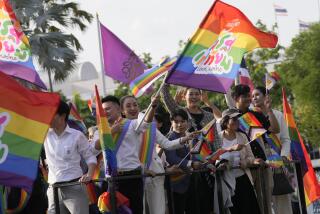Thailand begins a year of mourning after the death of its beloved king
Thai mourners, holding a picture of their late King Bhumibol Adulyadej and his brother King Ananda Mahidol, wait for the procession carrying Adulyadej’s body from Siriraj Hospital to the Grand Palace in Bangkok, Thailand, on Oct. 14, 2016.
Reporting from Chiang Mai, Thailand — Thailand awoke Friday to grief and uncertainty as it began a one-year official mourning period after the death of the country’s beloved monarch of 70 years.
The highly revered king, Bhumibol Adulyadej, died Thursday at age 88 after years of illness and was considered a rare unifying figure in the country’s recent tumultuous history.
A national holiday was declared as leading newspapers and news websites published in monochrome, movies and concerts were rescheduled and all television channels were airing the same tributes to the late king, the world’s longest-ruling current monarch.
State officials and other civil servants were told to maintain an official mourning period of one year. The government asked Thais to avoid wearing bright colors or hold any festive events for 30 days.
The king’s body was moved Friday from Siriraj Hospital in Bangkok to the Grand Palace for a royal bathing ceremony. Lining the procession route, thousands of Thai mourners clad in simple black or white clothing waited patiently beginning in the early morning to pay their respects.
Among those partaking in the bathing ceremony was Crown Prince Maha Vajiralongkorn, the only son of the late king, who was expected to take over the throne from his father.
But no date has been set for a coronation. The leader of Thailand’s ruling junta, Prime Minister Prayuth Chan-o-cha, told reporters that the crown prince had decided to delay his enthronement to “take time to express sadness with the people nationwide for the time being.”
The delay meant that Thailand was without a king for the first time in 70 years. The head of the Privy Council, Prem Tinsulaninda, will act as regent.
Prem and the crown prince have had an acrimonious relationship over the years, sparking further speculation about the king’s succession — talk of which remains a taboo subject due to vaguely worded laws that prohibit any discussion seen as insulting to the monarchy.
Yet in quiet conversations and online forums, the thrice-divorced Vajiralongkorn is widely seen as a playboy ill at ease with the highly public role his Massachusetts-born father played for decades.
The Paris-based Reporters Without Borders advocacy group released a statement calling on the junta “not to restrict reporting, and not to crack down on all those, including journalists and internet users, who comment on King Bhumibol Adulyadej’s death … and its consequences.”
Thai officials were still grappling with the impact of the king’s death on the country’s economy, 10% of which comes from tourism. The Thai stock market rose more than 4% in morning trading in a sign of confidence in the economy.
Though some establishments in Bangkok closed early after news of the king’s death, in the northern city of Chiang Mai, many businesses were operating as usual. Along the narrow streets, hawkers beckoned throngs of tourists while bars and shops remained open and as brightly lit as the day before.
Some Thais found more personal ways to express their grief.
“I wore black not because of Prayuth [asking it of the people] but because I wanted to show my grief myself,” said Tong, who manages a wine bar in the old square and goes by only one name.
“The king was like my father. I wanted to cry.”
Tong said that although she agreed with the call to avoid loud music during the 30-day mourning period, many neighboring bars were avoiding the more severe prohibitions expected of them in order to continue attracting tourists.
“We rely on them,” she said. “If they come and we are all quiet or closed for long, I think then it’s also not good.
“So we go to our own wats [temples] and pray in private.”
Special correspondent Ramsey reported from Chiang Mai, and staff writer Bengali from Mumbai, India.
Follow @SBengali on Twitter for more news from South Asia
More to Read
Sign up for Essential California
The most important California stories and recommendations in your inbox every morning.
You may occasionally receive promotional content from the Los Angeles Times.











